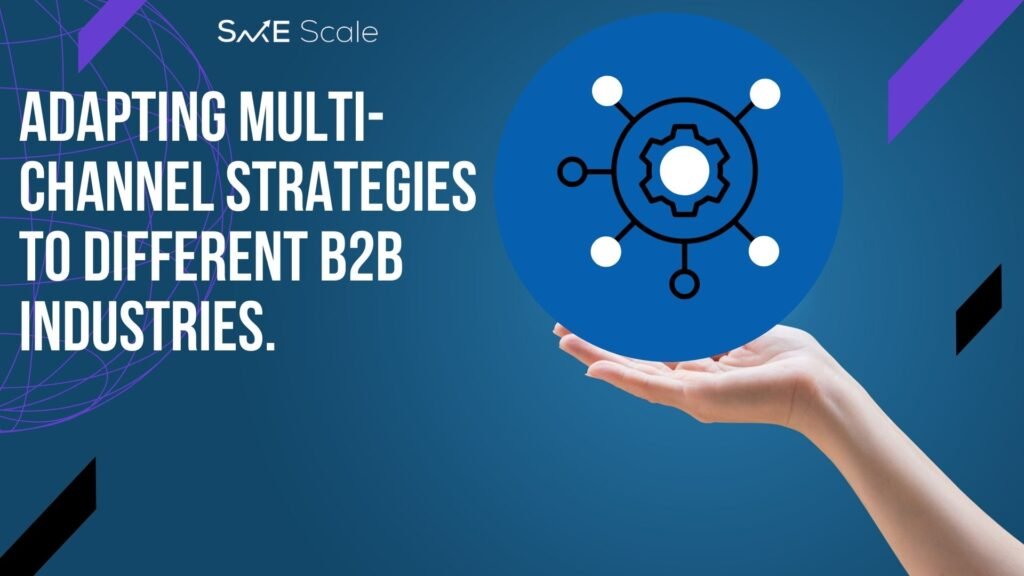
In the diverse landscape of B2B marketing, a one-size-fits-all approach rarely works. Each industry has its own unique characteristics, challenges, and customer behaviors that require tailored strategies to achieve success. As businesses increasingly adopt multi-channel marketing to engage their target audiences, the need to adapt these strategies to the specific nuances of different B2B industries becomes paramount. In this blog post, we’ll explore how to effectively adapt multi-channel strategies to suit the distinct needs of various B2B industries.
Understanding Industry-Specific Dynamics
Before diving into the specifics of adapting multi-channel strategies, it’s essential to understand the key dynamics that differentiate one industry from another. Factors such as sales cycles, decision-making processes, regulatory environments, and the role of digital channels can vary significantly across industries. For instance, the technology sector often experiences shorter sales cycles and rapid innovation, while industries like manufacturing or healthcare may have longer, more complex buying processes with strict compliance requirements.
Tailoring Multi-Channel Strategies to Industry Needs
Technology and Software: The technology and software industry is characterized by rapid change, innovation, and a highly informed customer base. In this industry, multi-channel strategies should focus on digital channels such as content marketing, webinars, and social media, which are effective for educating prospects and showcasing thought leadership. Personalization is key, as tech buyers expect relevant, timely information. Utilizing marketing automation to deliver personalized content at each stage of the buyer’s journey can significantly enhance engagement and conversion rates.
Manufacturing and Industrial: In manufacturing and industrial sectors, the buying process is often complex, involving multiple stakeholders and lengthy decision-making timelines. Multi-channel strategies for this industry should emphasize a mix of traditional and digital channels. Trade shows, industry-specific publications, and direct sales efforts remain crucial, while digital channels like LinkedIn and email marketing can support lead nurturing and relationship building. Case studies, product demos, and technical content can be particularly effective in demonstrating the value and capabilities of your offerings.
Healthcare and Life Sciences: Healthcare and life sciences operate in a highly regulated environment where trust and credibility are paramount. Multi-channel strategies in this sector should prioritize content that emphasizes compliance, safety, and efficacy. Educational content, such as whitepapers, research studies, and webinars, can help establish your brand as a trusted authority. Email marketing, SEO, and paid search campaigns are effective for reaching healthcare professionals, while social media can be used to engage with broader audiences, including patients and caregivers, where appropriate.
Financial Services: The financial services industry requires a strategic approach that balances compliance with customer engagement. Multi-channel strategies should focus on building trust through transparent communication and educational content. Email marketing, personalized landing pages, and content marketing are effective for nurturing leads, while paid media and SEO can drive awareness. Given the importance of relationship management in this industry, integrating CRM systems with marketing automation can ensure that all client interactions are consistent and aligned with regulatory requirements.
Professional Services: In professional services, such as consulting or legal services, the emphasis is often on building relationships and demonstrating expertise. Multi-channel strategies should leverage content marketing, thought leadership articles, and webinars to showcase your firm’s knowledge and capabilities. LinkedIn is particularly valuable for networking and lead generation in this industry. Additionally, email marketing and personalized outreach can help nurture leads through longer sales cycles, ensuring that your firm stays top-of-mind when potential clients are ready to make a decision.
Best Practices for Adapting Multi-Channel Strategies
Conduct In-Depth Industry Research: Before adapting your multi-channel strategy, it’s essential to conduct thorough research on the specific industry you’re targeting. Understand the key challenges, customer pain points, and preferred communication channels. This knowledge will inform your strategy and ensure that your messaging resonates with your audience.
Segment Your Audience: Even within a single industry, different segments may have unique needs and behaviors. Segment your audience based on factors such as company size, job role, and stage in the buying process. Tailoring your messaging and channel strategy to each segment increases the relevance and effectiveness of your campaigns.
Leverage Industry-Specific Content: Content is a critical component of any multi-channel strategy, and it should be tailored to the specific needs of the industry you’re targeting. Develop content that addresses the unique challenges, regulations, and trends in the industry. Case studies, whitepapers, and industry reports can be particularly impactful in demonstrating your expertise and building credibility.
Test and Optimize: As with any marketing strategy, continuous testing and optimization are key to success. Monitor the performance of your multi-channel campaigns across different industries and make data-driven adjustments as needed. A/B testing can help identify which messages, formats, and channels are most effective for your target audience.
Conclusion
Adapting multi-channel strategies to different B2B industries is not just about tweaking your messaging—it’s about understanding the unique dynamics of each industry and crafting a tailored approach that resonates with your audience. By conducting thorough research, segmenting your audience, and leveraging industry-specific content, businesses can create multi-channel campaigns that drive engagement, build trust, and ultimately, achieve greater success in the B2B marketplace.


